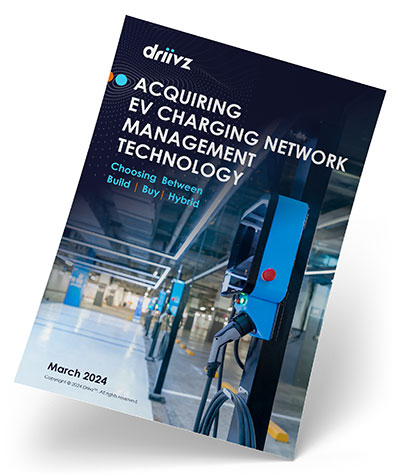What is the Open Charge Point Protocol (OCPP)?
The Open Charge Point Protocol (OCPP) is an open-source communications standard for the electric vehicle (EV) charging industry that defines how EV charging stations and back-end EV charging management platforms exchange information. Any OCPP-compliant EV charging station can be managed by any OCCP-compliant EV charging management system.
The business value of interoperability
This any-to-any interoperability enables flexible, future-proof investments across the industry. EV charging network operators can:
- Choose freely among compliant hardware vendors
- Mix and match charger vendors and equipment types depending on the local suppliers and use case
- Avoid being stuck with stranded equipment if a non-compliant manufacturer goes out of business
Interoperability allows EV charging management software providers to serve a broad market through hardware-agnostic support for any EV charge point operator that uses compliant equipment. Moreover, standards simplify the introduction of new features and functions that are supported by OCPP.
Why are open standards and OCPP important to the EV charging industry?
Open communications standards are key enablers of growth and innovation in the evolving EV charging industry, where new use cases and technological advancements are steadily emerging. Broad adoption of OCPP since its introduction in 2010 has made it the de facto open industry standard for EV charging network communications in both Europe and the United States, streamlining operations for multinational network operators and opening the door to new industry players.
Who manages OCPP?
The evolution of OCPP is managed by the Open Charge Alliance (OCA), a global industry alliance of EV charging hardware and software vendors, charging network operators and services providers, and research organizations. OCA fosters global development, adoption, and compliance of OCPP and related standards through collaboration, education and publications, testing, and certification.
What is the latest version of OCPP?
The newest edition of the protocol is OCPP 2.0.1, released in December 2022. OCPP 2.0.1 incorporates improvements to OCPP 2.0 in the areas of security, ISO 15118, Smart Charging, and protocol extensibility. The new release does not include any new functionality. OCPP 2.0 was a significant advancement of the protocol over the earlier version, OCPP 1.6. Neither OCPP 2.0 nor OCPP 2.0.1 are backwards compatible with OCPP 1.6.
What are the new features and improvements in OCPP 2.0.1?
Following are the new features introduced in OCPP 2.0 and enhanced in OCPP 2.0.1:
1. Document structure. The specification uses informative text, use cases, and tables of requirements to make it easier to read, implement and test.
2. Device model. This is a significant new feature that provides detailed information about charging stations to the management software platform, increasing the visibility of chargers in a network and making them much easier to operate. Although OCPP 2.0.1 does not in itself make charging stations more reliable, it provides the information and two-way communications that enable operators to reduce downtime. Device Model functions include:
- Inventory reporting
- Improved error and state reporting
- Improved configuration
- Customizable monitoring

3. Transaction handling. OCPP 2.0.1 consolidates the data and messages used to report transaction-related events, a more sophisticated approach that reduces the amount and complexity of data transmitted over the network. This is increasingly important to CPOs managing large numbers of stations and transactions. At the same time, more granular transaction data can aid billing, analysis, and troubleshooting.
4. Security. Built-in data encryption replaces the need for a virtual private network (VPN) to establish a secure connection between charging stations and the EV charging management system. Other improvements added to harden against cyberattacks include:
- Strictly defined security profiles for hardware and software authentication
- Key management for client-side certificates
- Secure firmware updates with signed firmware
- Security event logging
5. Smart Charging. Advanced smart charging capability lets the EV send information about the requested amount of energy and anticipated departure time. This allows a network operator to create an accurate charging profile to be used or updated during the transaction. It also enables the operator to adjust charging speed or timing to manage the load on the electrical grid.
6. Improved customer experience. OCPP 2.0.1 incorporates several enhancements designed to improve the customer experience, including:
- Support for multiple payment types, including credit carts or authorization via the EV’s MAC address
- Display messages in the EV drivers preferred language that show applicable tariffs prior to charging, running cost during a charging session, and final cost
- Support for generic messages on the display
7. Support for ISO 15118. Native integration with ISO 15118 provides advanced capabilities like Plug & Charge when supported by both the EV and the EV charging station. Drivers can simply plug in their cards and charging starts without further steps. Access and billing are handled by the communications between the car and the charger.
8. Vehicle-to-grid. OCPP 2.0.1 support for vehicle-to-grid (V2G) communications increases the possibilities for and potential of two-way charging. V2G compliance significantly improves energy management and makes it easier to achieve grid balancing, ensuring the power supply can meet power demands. Two-way connectivity will reduce the need to enhance energy infrastructure and will lower charging costs, directing energy from vehicles to the grid.
Driivz – OCPP Platform
Driivz OCPP platform provides industry-leading support for global EV charging standards and V2G communications, including OCCP 2.0.1, openADR 2.0 and ISO 15118. An OCA member and pioneer in the EV charging industry, Driivz was recently announced as one of the first OCPP 2.0.1 certifying companies, certified for both the Core and Advanced Security profiles. Driivz operates as a “golden node” used to validate the OCPP 2.0.1 conformance test cases and testing procedures. Learn more about the Driivz OCPP platform.




